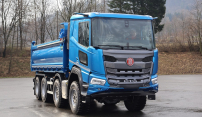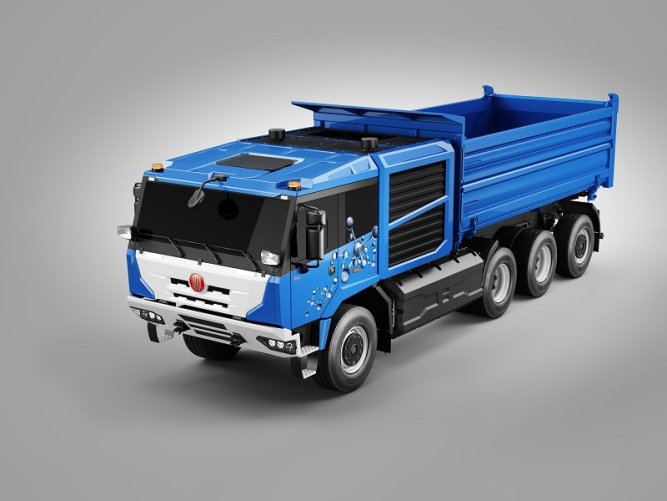- About the Company
TATRA today
- Company profile
- ET-link
- Company bodies and Organisation Chart
- Quality Management
- TATRA METALURGIE a.s.
- Sponsorship
History of TATRA
Tatra Trucks to showcase Tatra Phoenix vehicles in latest design for the first time at Bauma 2025
The 34th edition of the international Bauma trade fair will take place in Munich, Germany, from April 7 to 13. Held every three years, Bauma offers the opportunity to present innovations and special vehicles designed for the construction and mining industries. It is one of the largest events of its kind in the world. The Czech vehicle manufacturer Tatra Trucks has been exhibiting at Bauma for many years, as the construction and mining sectors are key markets for its products.
- Why TATRA
- Trucks
TRUCKS BY INDUSTRY SEGMENT
PRODUCT CATALOG
- Your TATRA partner
After-sales Services
Customer Centre
Original spare parts
Other
Dealer and Service Network
With the exception of Antarctica, you will find TATRA on every continent. We offer the largest network in Europe.
- Spare parts
- Contact
- Career
The Tatra Force e-Drive was presented in Ostrava for the world premiere with hydrogen fuel cells
24 October, 2023
On Monday 23 October, the third-generation Tatra Force chassis-based car with a hydrogen fuel cell propulsion system made its world premiere at the H2 Forum 2023 conference. The vehicle is being developed by a five-member consortium led by ÚJV Řež. Other partners in the project are Tatra Trucks, Devinn, the University of Chemical Technology in Prague and the Research Centre Řež of the UJV Group. The project is supported by the Technology Agency of the Czech Republic (TA ČR) in the Trend programme.
Tatra Trucks, which is owned by Czechoslovak Group and Promet Group, has recently been working on several development projects related to modern propulsion systems for trucks. One of the projects it is involved in is the development of the Tatra Force e-Drive hydrogen fuel cell electric vehicle (FCEV), the prototype of which was presented to the public for the first time at the H2 Forum 2023 conference - the largest event of its kind focused on hydrogen technology and hydrogen development in the Czech Republic, organised by the Moravian-Silesian Region as one of the founders of the Moravian-Silesian Hydrogen Cluster.
"Tatra has been a bearer of progress and innovation throughout its history. And this is no different now. The combination of the traditional proven Tatra chassis and hydrogen propulsion on the new Force platform creates a unique emission-free solution with a wide range of configurations and applications. This prototype is the first glimpse of the near future. Tatra and its partners will thus be able to offer customers the perfect vehicle to meet their own ESG goals and contribute to the birth and development of the hydrogen economy not only in our region," said Radim Matera from Promet Group's management responsible for innovation projects on the premiere of the Tatra hydrogen car.
ÚJV Řež, the parent company of the ÚJV Group, has been working in the field of hydrogen technology for more than ten years. It is behind the realization of the first Czech hydrogen bus TriHyBus and a hydrogen filling station in Neratovice, it is piloting, for example, an energy storage system using hydrogen technologies or it is developing a hydrogen range extender for emission-free municipal technology. "We use the long experience of the UJV Group with hydrogen to strengthen the awareness of the Czech industry of the possibilities of hydrogen technologies, and we also actively support the entry of new players and their products into this market," says Aleš Doucek, Head of the Hydrogen Technologies Department at UJV Řež.
Andrej Čírtek, spokesman for Czechoslovak Group, said: "If Tatra wants to have products that will find a place in demanding markets, it must follow the path of its own technical development, application of advanced technologies and innovations, as well as cooperation with partners representing the top in their fields, including academia. The hydrogen-powered Tatra project, on which we are cooperating with ÚJV Řež, Devinn and the Prague University of Chemical Technology with the support of the TA CR, is a good example of Tatra doing just that. Tatra's designers are also working on other technological projects for modern mobility, for example, a short time ago they presented a car with an automated driving system on the same platform as the new hydrogen-powered car."
Modern technologies on the new Tatra Force chassis
The basis for the prototype is the latest third generation of the Tatra Force model range, which had its world premiere in May at the PYROS 2023 trade fair in Brno. "For the Tatra Force e-Drive, we have used an eight-wheel chassis of the Tatra concept with a central support tube and swinging independently suspended semi-axles in a 1+3 configuration and three-axle drive. The prototype is designed as a truck for use in the mining industry with a total weight of 45 t. We want to test various technologies on it in the most demanding operating conditions," explained Radomír Smolka, Tatra Trucks' Director of Research and Development.
The drive of the prototype is electric, but it is designed to be independent of external power sources. The car therefore carries the power source with it. For this reason, in addition to a traction electric motor, traction batteries and two fuel cells, it also features pressurised gaseous hydrogen tanks. The fuel cells thus produce the necessary electricity by a chemical reaction from the hydrogen on board the car. The advantage of this concept is the very short filling time of the hydrogen tanks, which is in the order of minutes, and the downtime required for charging from external sources is therefore eliminated compared to battery electric vehicles. If an infrastructure with hydrogen filling stations is built, the flexibility of the vehicle will even be comparable to cars with conventional combustion engines.
Specifically, the prototype uses a traction permanent magnet synchronous electric motor with a continuous output of 480 kW and a maximum output of 580 kW, which has a torque of 2300 Nm. The two fuel cells have a maximum output of 100 kW each, while the traction batteries with a total capacity of 171 kWh use Li NMC (lithium-nickel-manganese-cobalt oxide) technology and have the option of being charged from an external source (plug-in). The vehicle is also equipped with a Tatra five-speed main gearbox with electronic shifting system.






